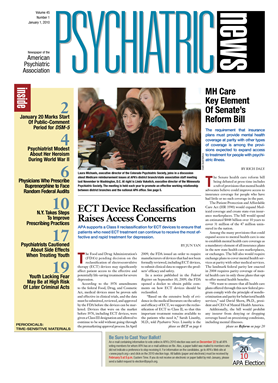The Food and Drug Administration's (FDA's) pending decision on the reclassification of electroconvulsive therapy (ECT) devices may significantly affect patient access to the effective and potentially life-saving treatment for severe depression.
According to the 1976 amendments to the federal Food, Drug, and Cosmetic Act, medical devices must be proven safe and effective in clinical trials, and the data must be submitted, reviewed, and approved by the FDA before the devices can be marketed. Devices that were on the market before 1976, including ECT devices, were given a Class III designation and allowed to continue to be sold without going through the premarketing approval process. In April 2009, the FDA issued an order to require manufacturers of devices that had not been formally reviewed, including ECT devices, to submit clinical data to support the products' efficacy and safety.
In a notice published in the Federal Register on September 10, 2009, the FDA opened a docket to obtain public comments on how ECT devices should be reclassified.
“Based on the extensive body of evidence in the medical literature on the safety and efficacy of ECT, we support the reclassification of ECT to Class II, so that this important treatment remains available to the patients who need it,” Sarah Lisanby, M.D., told Psychiatric News. Lisanby is the chair of the APA Task Force on ECT and director of the Division of Brain Stimulation and Therapeutic Modulation and a professor of clinical psychiatry at Columbia University College of Physicians and Surgeons. “At present, the FDA is requesting public comment on this matter, and we feel it is important for psychiatrists, patients, families, and all individuals whose lives are affected by the medical conditions that ECT treats to express their views about the importance of ECT in clinical practice.”
APA has published two editions of an evidence-based report on ECT guidelines, in which research on the efficacy and safety of the therapy was thoroughly reviewed. A new edition is currently being prepared by the task force and expected to be released next year. Given the evidence of their therapeutic value, APA believes ECT devices should have the Class II designation, which still requires special controls for their use but does not significantly hamper patients' access to the treatment.
If, however, the FDA determines that ECT devices carry high safety risks relative to efficacy and maintains a Class III designation, manufacturers are required to submit a premarket approval application for each ECT device and await agency review and approval. Small manufacturers that currently produce these devices may not be able to afford the cost of the development and submission process and cease to sell ECT devices altogether, Jennifer Tassler, J.D., APA's deputy director of regulatory affairs in the Department of Government Relations, told Psychiatric News.
Anti-ECT advocates have been pushing for a Class III designation, which could drastically limit the availability of ECT devices that are currently on the market or will be marketed in the future, according to Tassler. She noted that APA, along with experts on the APA Task Force on ECT, have been communicating with the FDA on this matter. Extensive documentation, including evidence from decades of clinical experience and scientific research, has been submitted to the FDA to support the safety and efficacy of ECT devices when they are used appropriately and correctly to treat certain patients.
